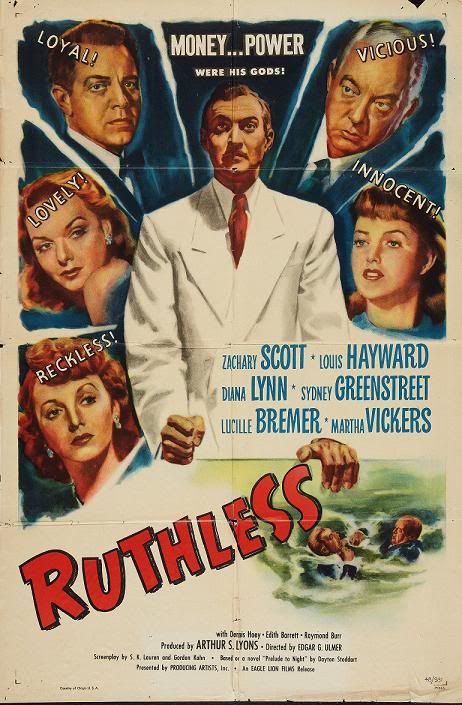
An old friend of Horace Vendig (Zachary Scott), the financial magnate in Ruthless arrives at a gala party late, explaining that to his host that he took a mistaken route when looking for the house of his childhood companion. Miffed that his boyhood chum wasn't there from the beginning as the leonine capitalist announced that he was giving millions to charity, Vendig, played with studied ambiguity by Zachary Scott, asks, "Isn't taking the wrong road one of those mistakes that happens when you want it to, subconsciously?"
This question is examined in an oblique way in Ruthless (1948), avoiding the simplistic Freudian analysis so prevalent in American movies of the period, but nevertheless implying that the past has a way of intruding on the present even when we can't see it there. Exploring the nature of success, Ruthless, which is filled with flashbacks, some expressionistic touches, and a remarkably polished look to the film, can be seen as a critique of capitalism, class consciousness or as a character sketch of American types in the first half of the 20th century. The film gave director Edgar Ulmer a chance to make an A picture for Eagle Lion in the late '40s and to explore the duality in his characters while working with some first rate actors, including Zachary Scott, Louis Hayward, Diana Lynn (in a dual role, yet!), Lucille Bremer and Sydney Greenstreet.
The latter two actors are simply outstanding in his movie. The beautiful dancer, Lucille Bremer, in what may be her best dramatic part before she retired from films to marry later in 1948, shows flashes of youthful Bette Davis-like vulnerability and volatility. She is well matched by the much older Greenstreet, who gives a spectacular performance as Bremer's husband, a Southern utilities baron whose lust for his young wife (Bremer) proves to be his undoing. When these two actors are alone on screen, the complex electricity between the two of them is unexpected and startlingly human. They seem to relish each other's company in their scenes, with each of them enacting characters who go from a kind of erotic self-satisfaction to ruined grandeur as their characters' age over the course of the story.
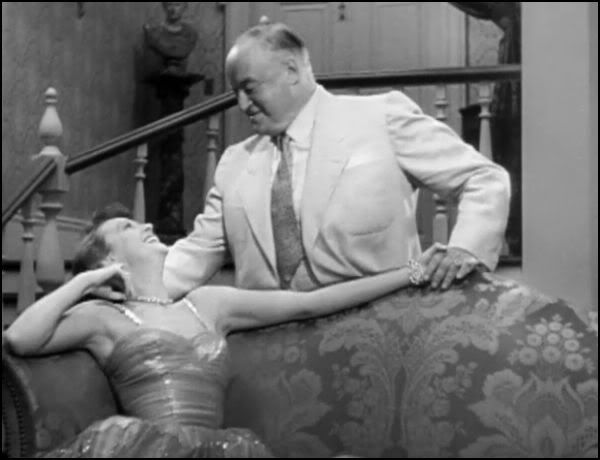
Lucille Bremer and Sydney Greenstreet as a compelling if strange married pair in Ruthless (1948).
Their games-playing and the private dialogue that seems to exist unspoken between people actually touches on something central in this movie, which demonstrates the ways that individuals play different roles in everyday life in so many ways that it finally becomes impossible to tell the authentic self from the mask a person dons to fulfill some goal. The performances all echo this, particularly that of Diana Lynn's innocent but knowing character of Martha Burnside, who senses the falseness of her fiance's emotions for her, but who plays along with the pretense of young love, hoping that her emotional ardor will compensate for his emptiness. As played by Zachary Scott, an actor whose surface glibness proved to be a blessing and a curse during his Hollywood career, the character of Vendig becomes more sympathetic as he grows more ruthless, since the actor is able to express his own puzzlement over his tangled emotions, which he keeps trying to unravel through outward actions that look like success, but hint at some deep-rooted unhappiness with himself.
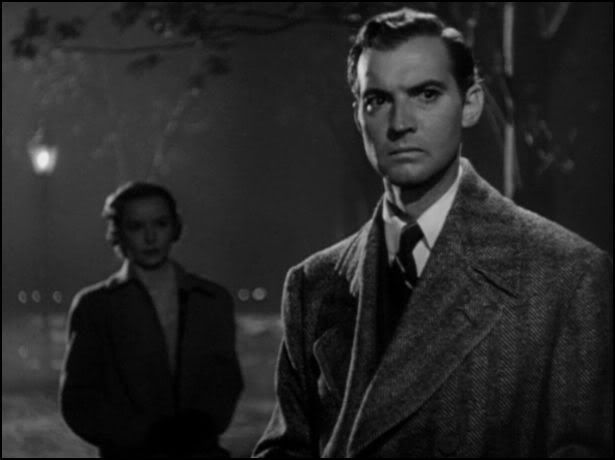
While Ruthless has often been compared to Citizen Kane in its detailed depiction of the rise and fall of an American businessman, the outlines of the story are similar to Welles' masterwork though they lack his visual and dramatic consistency, sureness and verve. Based on a novel by Dayton Stoddart and a screenplay Alvah Bessie, S.K. Lauren and Gordon Kahn, this movie could easily be interpreted as an anti-capitalist critique, but the beautiful cinematography by Bert Glennon, and the often subtle nuances of character make us sympathize with Zachary Scott's relentless drive to the top of the financial heap, even though he is revealed as a master manipulator of people and an unethical tycoon in business. While the film often threatens to become bogged down in the minutiae of financial details, it is the haunted quality hinted at in Scott's character that piques one's interest in the story.
After introducing the adult characters at the party, the film really begins with a long flashback to the story of Horace Woodruff Vendig (Robert J. Anderson as a youth, Zachary Scott as a man), a boy whose n'er do well father (Raymond Burr, effectively seedy in his one scene) neglects him and whose socially conscious mother (Joyce Arling) is physically and emotionally abusive toward the boy, until one night when he seeks the safety of the Burnsides, a well-to-do family whose kindness toward him has given him hope.
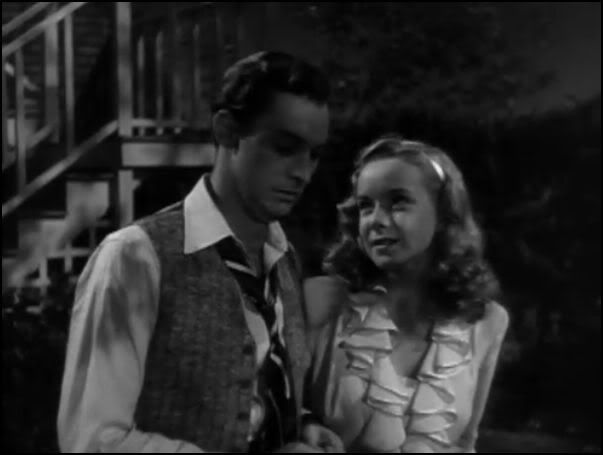
A youthful Horace Vendig (Zachary Scott) discussing their engagement with Martha Burnside (Diana Lynn).
They take him in, allowing him to live in their carriage house and finish school until he is a young man. At that time, his childhood friend (Louis Hayward, looking wan) returns from college for a visit, calling on the girl he intends to marry, Martha Burnside, played by Diana Lynn. Wondering why Martha hasn't made her feelings clearer to him in her letters, Hayward asks his friend Horace to intercede with the girl. When he does, Martha confesses her love for Horace instead, an unexpected but felicitous event, which he readily accepts. Their subsequent engagement leads her generous father (Dennis Hoey, for once escaping from the "dumb cop" hell he had been confined to in the casting offices of Hollywood) to finance his education at Harvard. Even Hayward's character refuses to bear a grudge toward Horace.
Eventually, at Harvard and beyond, Horace's mastery of social poses, intelligence and business acumen gain him the admiration of a host of influential people, including the saucy yet patrician and avidly lustful Martha Vickers, who soon leads him astray--straight to a Wall Street career. Zachary Scott breaks off from Lynn's Martha Burnside character in a beautifully played scene in which Horace seems to be aware for the first time of his own dual nature. As the movie progresses, he leads others to their ruin, accumulating power and money himself. Finally, he invites his oldest friends (Louis Hayward, whose character is really too passive), who brings a young woman who looks remarkably like Martha Burnside, (also played by Diana Lynn, though this time she is more sure of herself as a person) enemies (Greenstreet and Bremer) and various business toadies to his Xanadu-like home where he announces that he is setting up a Peace Institute, endowing it with $25 million and sailing away on his yacht to parts unknown. The ending, which I won't spoil for you, is melodramatic, but apt.
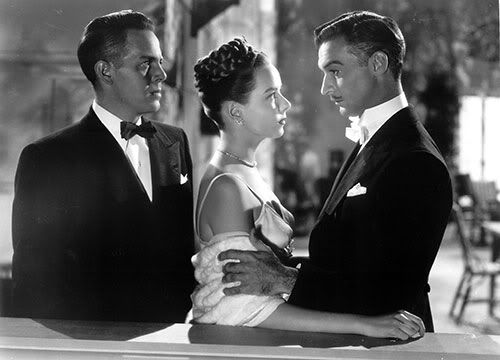
Louis Hayward, Diana Lynn (in a dual role), and Zachary Scott in Ruthless (1948).
Long unavailable on DVD and rarely broadcast, this film (which Dewey1960 showed at one of his recent events at the Roxie) is now streaming online at Netflix in a beautiful print and has recently been issued on DVD here. One other thing: unlike The Great Gatsby (1948) that we were discussing elsewhere on the boards recently, this film does an excellent job of recreating the hair and clothing of the '20s for both men and women. Zachary Scott and Louis Hayward, both in their '30s at the time of this production, do the best they can to convey teenage and early adulthood in their roles, but it does stretch credibility at times.
